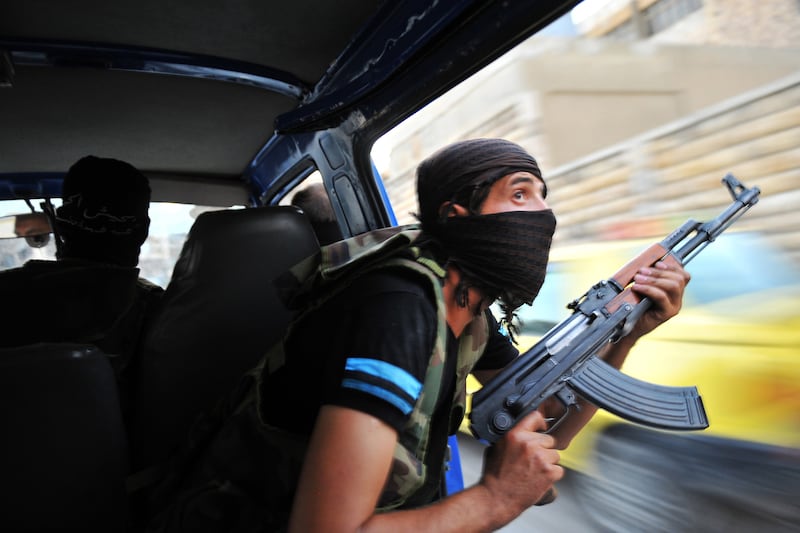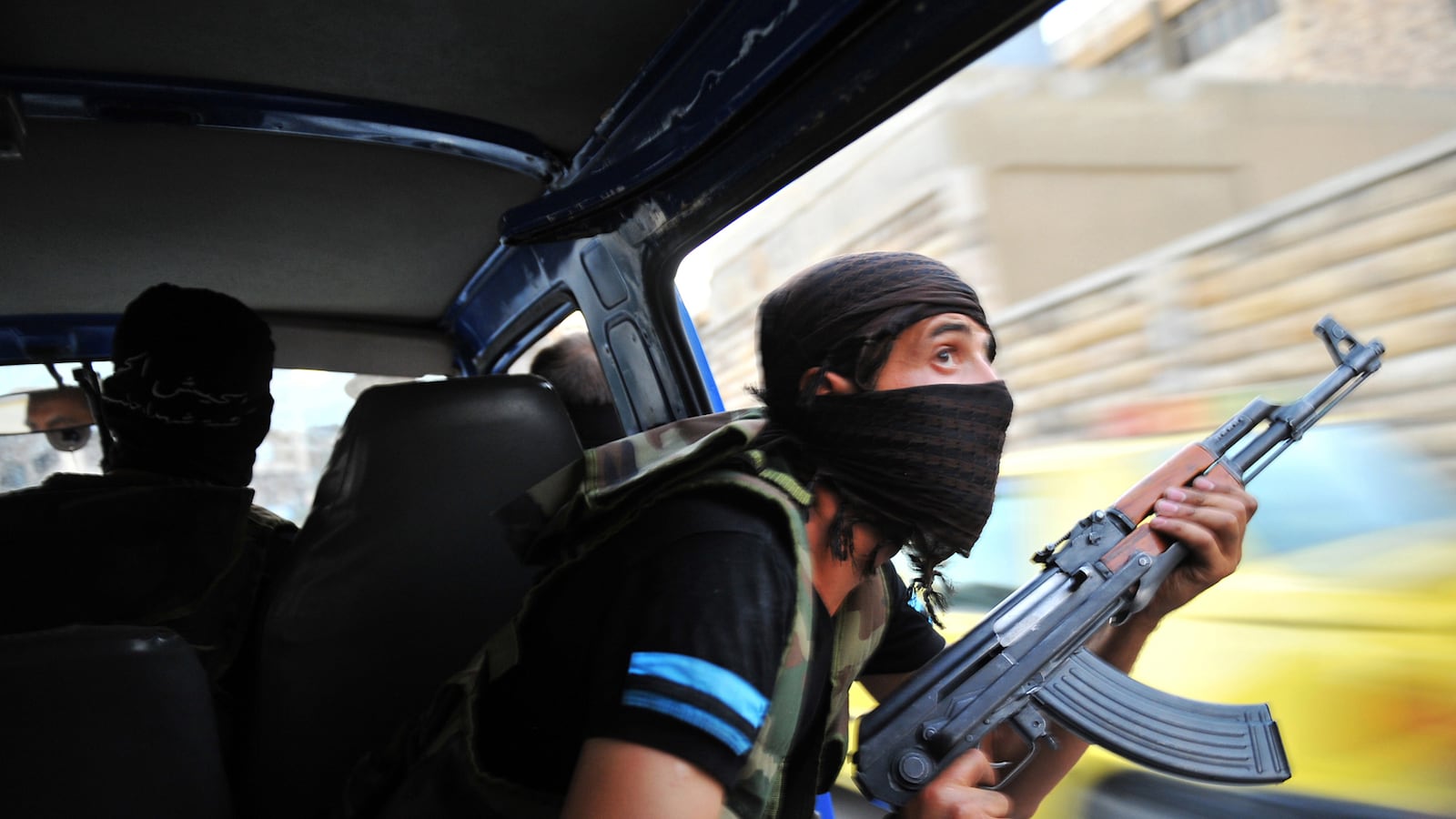The general leading Syria’s armed rebellion cautioned yesterday that his forces remained dangerously divided and underfunded—and that al Qaeda and other jihadist groups are taking advantage of the confusion to gain a foothold in the ongoing conflict.

Gen. Mustafa al-Sheikh, who heads the military council of the Free Syrian Army, said in an interview that notions that the Syrian regime may be on its last legs are belied by the difficulties the rebels continue to face on the ground. “The reality is not like it appears,” he said. “We’re not there yet.”
A string of FSA successes over the last two weeks—including the seizure of border posts and the first sustained offensives inside Damascus and Aleppo, Syria’s two most important cities—has brought with it speculation that an endgame may be at hand. Aleppo, Syria’s commercial capital, has seen particularly intensive fighting in recent days, and the unexpected rebel presence there has dealt a blow to the strongman stature of Syrian President Bashar al-Assad. “The fall of Aleppo will be the fall of the regime,” Sheikh said.
But Sheikh, speaking by phone from the refugee camp near the Turkish border where the FSA council is based, said such a milestone victory was still out of the FSA’s reach. The rebellion, he said, would continue churning along as a drawn-out and difficult affair. With Assad’s forces marshaling for a massive confrontation in Aleppo last night, Sheikh worried that the rebels’ shortcomings in organization and resources would eventually force them to pull back. “The FSA isn’t powerful enough yet to take Aleppo—especially because of the weapons situation,” he said. “My god, we need everything. We are dying. We don’t have bread to eat. There is nothing. No communications. No weapons. No medicine.”
A lack of coordination and material support has defined the FSA effort since it began. So too have its calls for international assistance—in particular, weapons. Sheikh said his forces were ill-matched against the well-armed Assad regime, and that the FSA also remained a poorly organized group, at least in terms of chain of command. “Everyone works on his own,” he said. “We are not a collective group.”
As the uprising drags on, Sheikh said, these problems are paving the way for an alarming development—the arrival of al Qaeda and other jihadist groups into the armed struggle against Assad. “They are getting bigger and bigger. And day by day they have more powerful positions inside,” he said. “The situation is very dangerous.”
Sheikh is the first senior opposition figure to voice concerns that al Qaeda and other jihadist fighters are operating inside Syria. Some outside analysts have made the case for months, even as opposition leaders have insisted that there is no evidence to support the claims. “The opposition used to insist that ‘there’s no such thing as Al Qaeda in Syria,’ and it really just made them sound full of it. It hurt their credibility,” says Joseph Holliday, a former U.S. Army intelligence officer who is tracking the Syrian conflict at the Institute for the Study of War in Washington, D.C.
Evidence, meanwhile, seems to be mounting. The New York Times reported today that the Baba al-Hawa border crossing into Turkey, which sits a short distance from the Apaydin camp that Sheikh and the rest of the FSA brass call home, has “quickly become a jihadist congregating point” since being captured recently by rebel troops. The report also noted that three Qaeda and Qaeda-linked groups are believed to be operating inside Syria, with one claiming credit for a fraction of the spate of car and suicide bombings that have become a regular feature of the conflict over the past eight months. Assad hails from the Alawite sect, an offshoot of Shiite Islam that al Qaeda, a Sunni group, considers a natural enemy.
When asked by Newsweek/The Daily Beast recently whether remnants of al Qaeda were moving into Syria from Iraq, Hoshyar Zebari, the Iraqi foreign minister, said he was sure it was the case. “We believe so. This is our information, as well as the U.N., as well as the Americans. This is a fact.”
Those pushing Western governments to play a greater role in Syria often contend that failing to do so invites extremist groups to fill the void. “Extremist groups, al Qaeda-plus and all, are definitely in Syria,” says James Prince, founder and president of the Democracy Council. “We need to learn from similar lessons in Iraq, Afghanistan and Egypt and not leave democracy activists fighting for their own freedoms swinging in the wind.”
Sheikh sought to strike a similar note in his comments today, using the specter of armed extremists to call on Western governments to act. “Leaving Syria like this is very dangerous. It may become another Afghanistan or Iraq,” he said. “The international community must do something and move quickly.”
Holliday, the ISW analyst, points out that al Qaeda and other jihadists groups are playing only a peripheral role. In a conflict that has been murky from the start, he adds, it can be difficult to determine which groups sit where on the extremist scale. Adding to the confusion, the rebels’ need for weapons and financial support has left room for foreign benefactors to step up to the plate—avoiding one critical mistake of Al Qaeda in Iraq by supporting local fighters or enlisting them to the cause.
Such concerns are likely to weigh on the minds of Western officials considering the prospect of wading deeper into the mix. “Into this mess come more conservative Islamist groups who are able to get greater access to weapons from places like the Gulf,” he says. “Then there’s this difficult problem: They’re not al Qaeda, but they are radicals. That’s hard for the West to parse out. Where do we put these guys on a spectrum?”
—With Christopher Dickey






